SOCIAL INNOVATION
VIDEO PITCH
SOCIAL INNOVATION | FUWA BIOTECH
From pineapple waste to Eco Enzyme cleaners
for a greener lifestyle
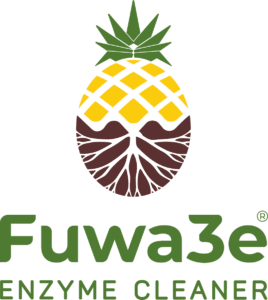
ABOUT FUWA3E:
FUWA Biotech is a social business in Vietnam that has successfully produced bio-enzymatic cleaning products from pineapple skins, and we believe this is the next chapter for current cleaning products.
“FUWA” is an abbreviation of the phrase “Fruit Warrior” – warriors of fruits with a mission to eliminate stains. “3E” stands for Enzyme – Ecosystem – Earth, meaning that all products will always adhere to three criteria: production based on Eco-enzyme technology, protecting the ecosystem, and contributing to creating a greener Earth.
Vision & Mission:
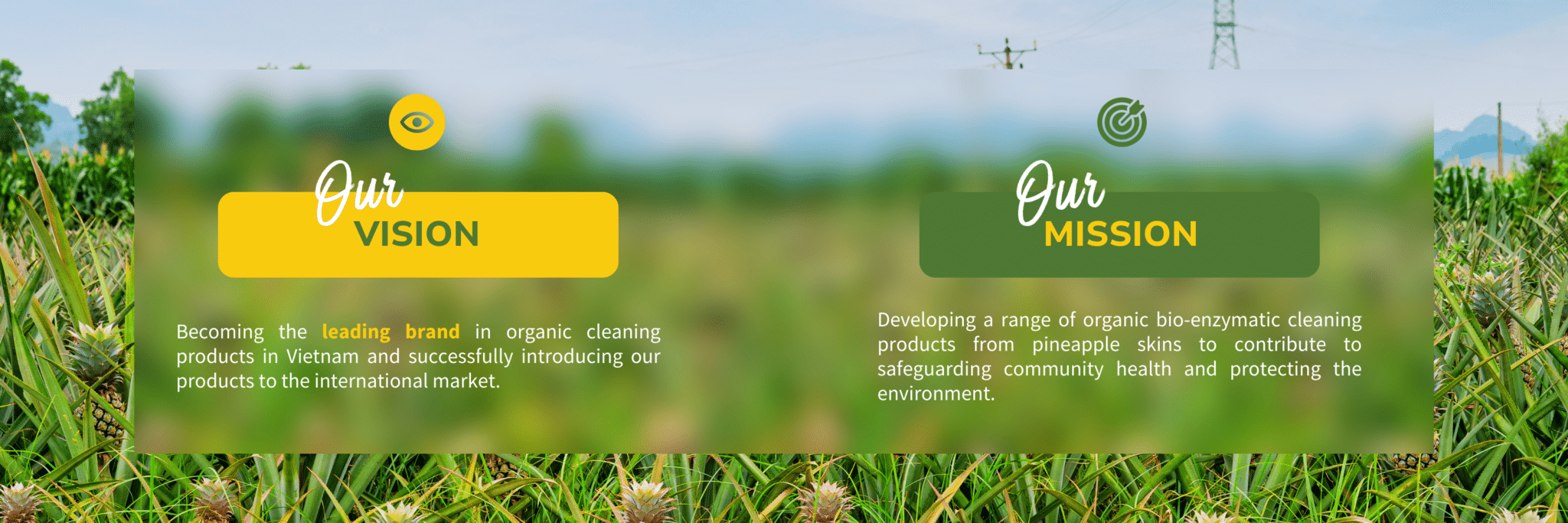
In the process of development, FUWA always aims at 4 sustainable development goals set by the UN:

TARGET ISSUES:
The daily use of cleaning products has become an essential aspect of human life. However, few people know that the main ingredients for producing these cleaning detergents are mainly chemicals, substances that are very harmful to both users and the environment.
Negative impact of chemical cleaning products on Human Health:
A research conducted by Temkin et al. (2023) detected a total of 530 unique volatile organic compounds (VOCs) in the 30 products. Of these, 193 VOCs were hazardous – identified as having the potential to cause health harms such as respiratory system damage, increased cancer risk and developmental and reproductive impacts.
According to Dr. Hoang Tung Anh – a Vietnamese medical expert, there are about 70,000 chemicals used in household cleaning. If not used properly, cleaning products can harm the digestive system, causing digestive disorders, allergies, skin cancer, reproductive disorders, birth defects in pregnant women, sepsis, or even cancer.
In an initial survey, FUWA3e figured that 20% of consumers had skin problems from being frequently exposed to household cleaning products, and 80% were willing to invest in healthier ones.
Negative impact of chemical cleaning products on the Environment:
In addition to human health effects, chemical cleaning agents can also negatively affect the environment, especially water quality, thereby harming aquatic and terrestrial life.
According to a United States Geological Survey, 69% of streams sampled contained persistent detergent metabolites and 66% contained disinfectants. It is estimated that up to 20% of all toxic pollution in municipal sewage comes from household cleaners. In a city of a million people, approximately 372 million tons of toilet bowl cleaner and 1,569 tons of liquid household cleaners go down the drain annually, contaminating ground and surface waters.
Not only water but also the quality of air both indoors and outdoors is affected by VOGs included in chemical cleaning products. Some products emit VOCs for days, weeks or even months. A study from 2018 estimated that 50% of the VOCs responsible for air pollution stem from cleaning products.
FUWA3E thoroughly conducted research to learn about the substantial effect of toxic substances contained in household cleaning agents, thereby taking practical actions to reach sustainable goals and tackle consumer pain points. We gathered qualified Secondary data from official sources like NPDS, UNDP, USGS and ScienceDirect.
ROOT CAUSES:
Those problems mentioned above come from 2 main reasons:
Lack of Awareness:
Many people may not be fully aware of the potential health hazards associated with household cleaning products or how to use them safely. It is estimated that 65% of consumers indicated never having seen the health hazard pictogram before and nearly 50% of all parents indicated that they did not understand the label. Some consumers may not have access to or knowledge of safer alternatives to traditional chemical cleaning agents, leading them to continue using potentially harmful products.
Harmful Chemical Composition:
Many household cleaning products contain chemicals that are not easily biodegradable and can persist in the environment. The toxic substances in cleaning agents do not disappear after use but end up in waterways and sewage systems, polluting water sources and harming aquatic life.
Chemicals such as phosphates, ammonia, and chlorine bleach commonly found in cleaning products can contribute to water pollution. For example, phosphates can cause algal blooms and oxygen depletion in water bodies, leading to fish kills.
CURRENT SOLUTION LANDSCAPE:
Brand Positioning Map
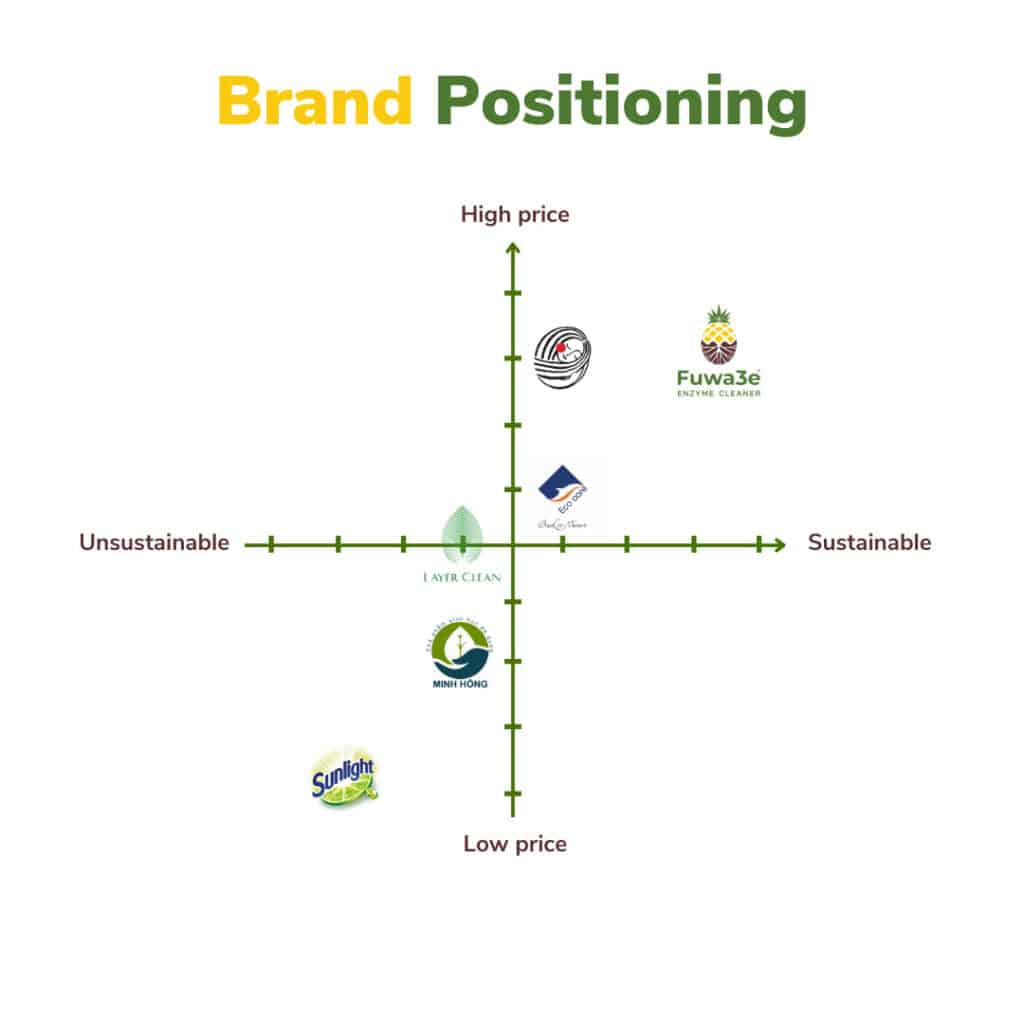
Product Ecosystem Analysis
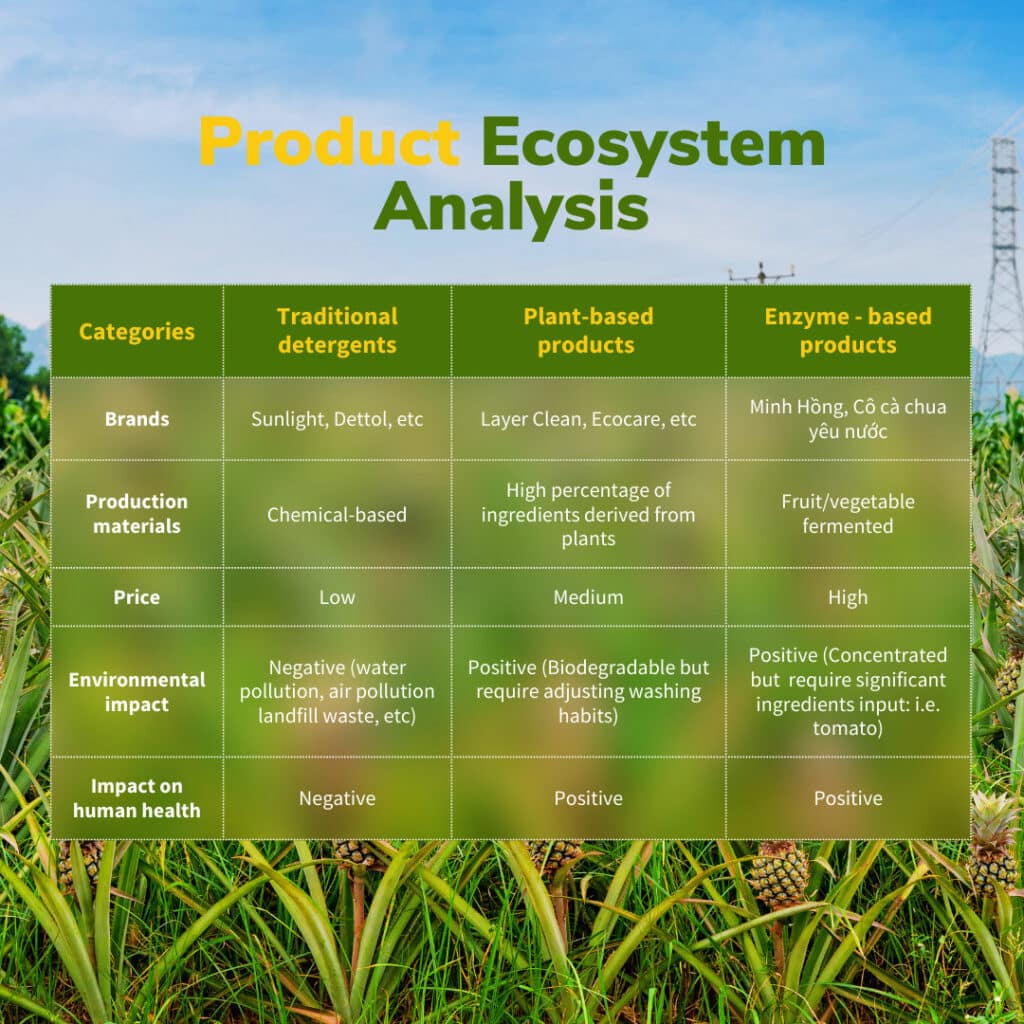
With those problems mentioned above, we are urged to produce natural, safe, non-toxic chemical products to help people do housework safely and worry less about cleaning chemicals. We apply Eco Enzyme technology from Pineapple skin with abundant local pineapple scraps, combining native essential oils to create all-natural cleaning products. Our product ingredients are unique, which includes: (1) Bio ingredient: eco-enzyme fermented from pineapple skin, (2) Organic ingredient: plant-based additives and (3) Local natural essential oil.
The pros of the eco-enzyme are that it is cheap because the main ingredients are raw fruits/vegetable waste, easy to produce, non-toxic because it is made from all-natural ingredients (free of harmful chemicals), and breaks down soils quickly. Eco-enzyme have been used to treat wastewater and sludge removal from freshwater as a cheaper alternative to regular waste handling procedures. Eco-enzyme can also be used to clean multiple surfaces without any toxic side effects on humans and pets. Moreover, the wastes from making the eco-enzyme can be used as an excellent fertilizer, thereby reducing the amount of garbage in the landfill.
SOLUTION TO IMPLEMENT:
We believe our solution is unique, as we create social impact in every stage: local pineapple waste as input, all-natural ingredients in the production process and minimize plastic waste with refill stations.
Solution design:

Input:
FUWA purchased fruit waste from local factories that make canned pineapple because our province – Thanh Hoa is one of the largest pineapple orchards in Vietnam. Pineapples are grown and cared for 18 months, reaching 35 – 40 tons/hectare. While pineapple peels are left unused and treated improperly, causing soil and water pollution, we acknowledge that they contain organic acids and Bromelain enzymes, which can be used to produce bio cleaning products.
With this process alone, FUWA has been able to save 300 tons of pineapple trash annually.
Therefore, this stage aligns with the UN’s Goal 8 – Decent work and Economic Growth. We promote and support local farmers by sourcing natural ingredients directly from agricultural sources, thus helping local farmers increase their income from pineapple fields, contributing to the economic development of our province.
Production stages:
Only organic components are used in this stage.
This stage aligns with the UN’s Goal 12 – Responsible Consumption and Production. FUWA utilises pineapple skins, an agricultural byproduct, to produce environmentally-friendly cleaning products. The pineapple peel waste, after fermentation, is used as natural fertilizer to enrich the soil with minerals, promoting healthy plant growth.
Sugar and clean water are added to pineapple peels, the mixture is fermented for three months. This generates organic fertiliser for surrounding fields and liquid enzymes, which is the base of all FUWA products. The liquid is combined with additives like coconut oil, corn oil and essential oils to make the final products.
The detergents are then packaged and shipped to markets and customers. Based on primary research, with these eco-friendly products, FUWA has been able to reduce 54000 litres of toxic waste.
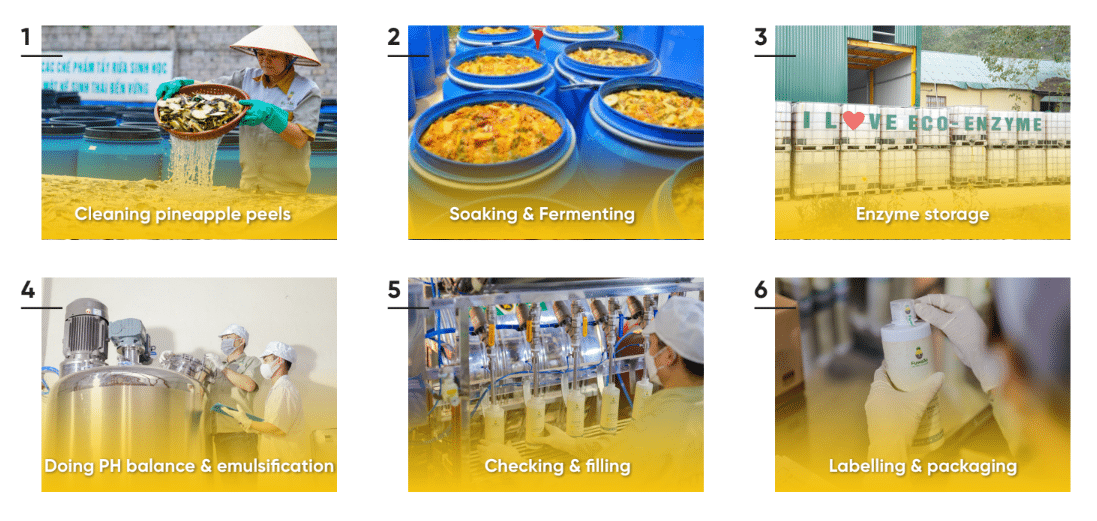
Products:
Cleaning products made by FUWA are diversified to optimize benefits for our customers.
- Home care: Oil spray, Dishwashing gel, Floor Cleaner,etc
- Baby care: Toy Cleaner Spray, Baby Bottle Cleaning sets
- Car care: Interior Cleaner & Spray, Essential Oil
- Pet care: Shampoo, Smelling Spray
Our products are continuously developed, which can make up for all defections and ineffectiveness of alternative solutions mentioned above. With a commitment of 0% Colorants, 0% Artificial Fragrances and 0% Harmful Chemicals, our products offer 5 benefits:
- Effective cleaning
- Safe for skin and health
- Time-saving, money- saving, water-saving
- Beneficial for community
- Environmentally friendly
The quality of our final product meets the UN’s Goal 3 – Good Health and Well-being as Eco Enzymes are not only beneficial but also safe for health, healing various skin conditions like wounds, burns, inflammation, insect bites, etc. Importantly, it is gentle and does not cause skin irritations, even for babies or those with sensitive skin.
Refill stations:
This stage aligns with UN’s Goal 15 – Life on Land, FUWA’s products are designed for reusing and refilling, helping to minimize the amount of plastic waste bottles.
Also, through our Refill model, many consumers became highly aware of their significant impact on social and environment from a greener lifestyle. FUWA has helped consumers save around 20–30% of the cost with 200+ refill stations and promises to decrease 150,000 plastic bottles.
SOLUTION UNIQUENESS:
FUWA is the first enzyme-based cleaning product in Vietnam, taking advantage of Bromelain enzyme (protease) in pineapple to become organic cleaning products with high cleaning effect and safety for health and environment.
FUWA develops innovative use of pineapple peels, which usually get disposed of, for its antibacterial properties and pleasant aroma. We also prioritize sustainable sourcing and incorporate local essential oils, while our circular economy and refill model address waste management issues effectively.
Current solution impacts
FUWA is Top 1 NRC Bestseller on Shopee platform with 70,000+ products sold and average 4.9/5.0 stars for positive reviews.
We have also exported the first large orders to demanding markets such as the United States, Singapore, Malaysia, China, etc and continue to work with other current partners such as Poland, Germany, Japan, Korea, etc to spread the story of our homeland pineapple worldwide.
We’re officially available on Amazon, Shopee, Tiki, Lazada, TikTok, etc and also AEON Mall – Japan’s leading retail hypermarket chain, clean food stores and organic markets in Vietnam.
FUWA has appeared on numerous social media channels locally and internationally such as Viet Success, VTV, TEDX, Business Insider, Insider Tech, etc. We’ve effectively spread the story of our eco-friendly products and motivate a greener lifestyle with 10+ million views in total. FUWA has also participated as sponsor and speaker for national schools events, workshops and forums such as Greenfield School, True North School, Sustainable Development Workshop, etc. We keep actively pushing forward strategies to maximize consumer awareness to the greatest extent.
Scale-up Potential
FUWA has successfully implemented the circular economy model in both production and consumption processes, making our factory a zero-waste facility. This model includes many other benefits, including cost savings, job creations, environmental protection, resources efficiency, etc.
If this Eco Enzyme technology is transferred and applied in other countries around the world with similar potential in raw materials like pineapple, for example: African countries, it will help create a ripple positive impact on current global environmental issues.
FUWA also aims to develop and expand products in countries with growth potential in enzyme-based cleaning products like Canada, which accounts for approximately 28.3% of market share. As Canada is also moving to its Zero Plastic Waste Goal and promoting a circular economy, FUWA can reach more people in need and expand our social impact.
Feedbacks from customers:
Pham Giang, 35 years old, a mother of two children in Hanoi said she started looking for organic products and those with natural origins a few years ago when she had her first child. As a customer of FUWA, she said: “They are chemical-free, biodegradable and gentle on the hands and the environment. The wastewater discharged after washing dishes is also unharmful to the environment.” Giang found out that enzyme products were good choices.
Nguyen Thu Ha, a primary teacher in Hanoi also reviewed: “I feel reassured when my children use such natural products.”
At first, the concept of enzymes in Vietnam was still quite new. In order to convince customers, we went to great lengths to give out samples for each person to try. Gradually, the first customers were persuaded and spread the word. The product became increasingly known. More and more people prefer enzyme cleaners to synthetic chemical ones because of their advantages and their good impacts on the environment.
ENGAGEMENT STRATEGY:
Stakeholder Mapping
Based on the Power Interest Matrix, FUWA categorizes our stakeholders depending on their power and interest in the business.

Stakeholder engagement plan
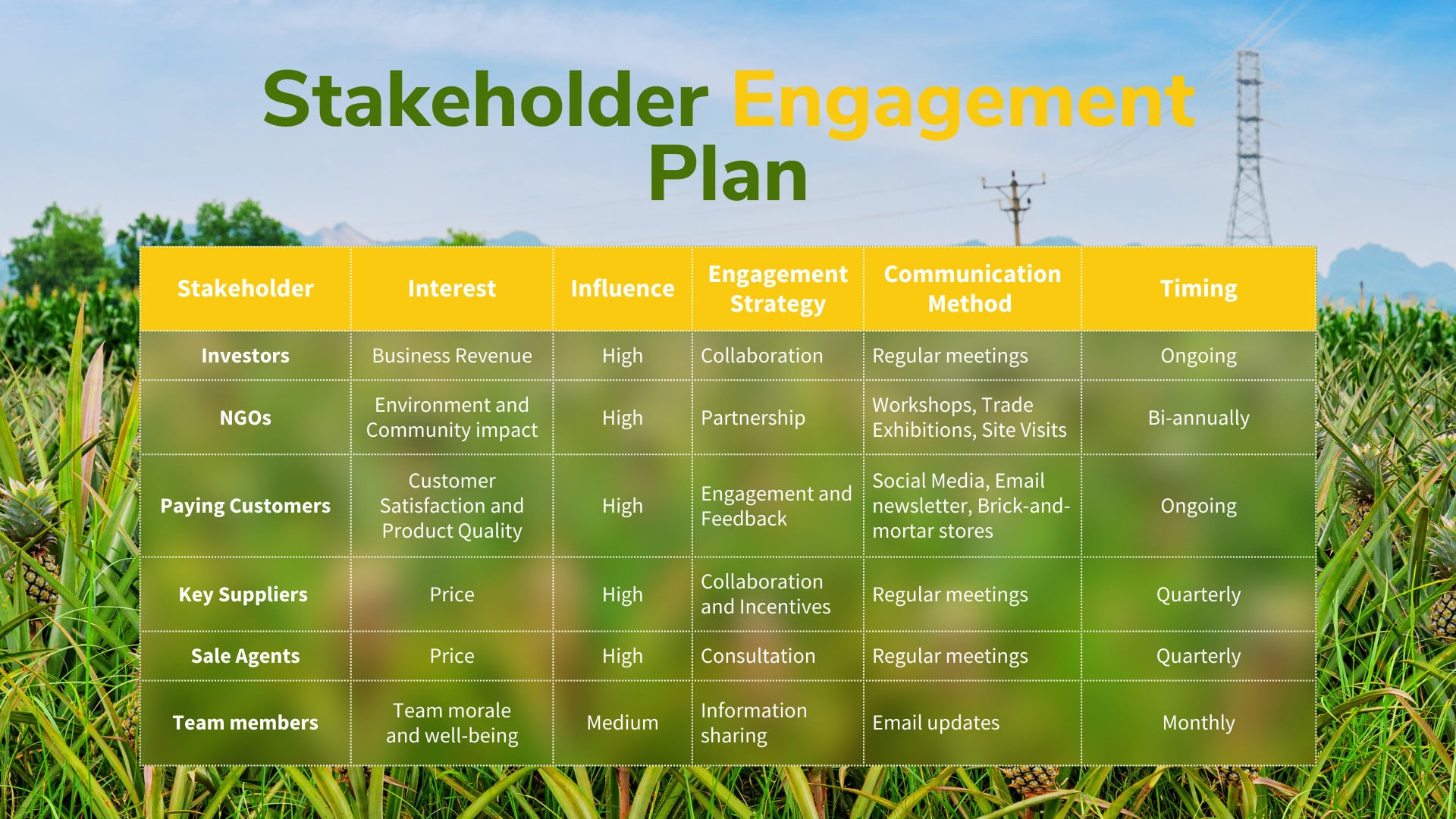
Social support campaign performance
- Trade Activities
FUWA has been involved in various trade activities since its establishment:
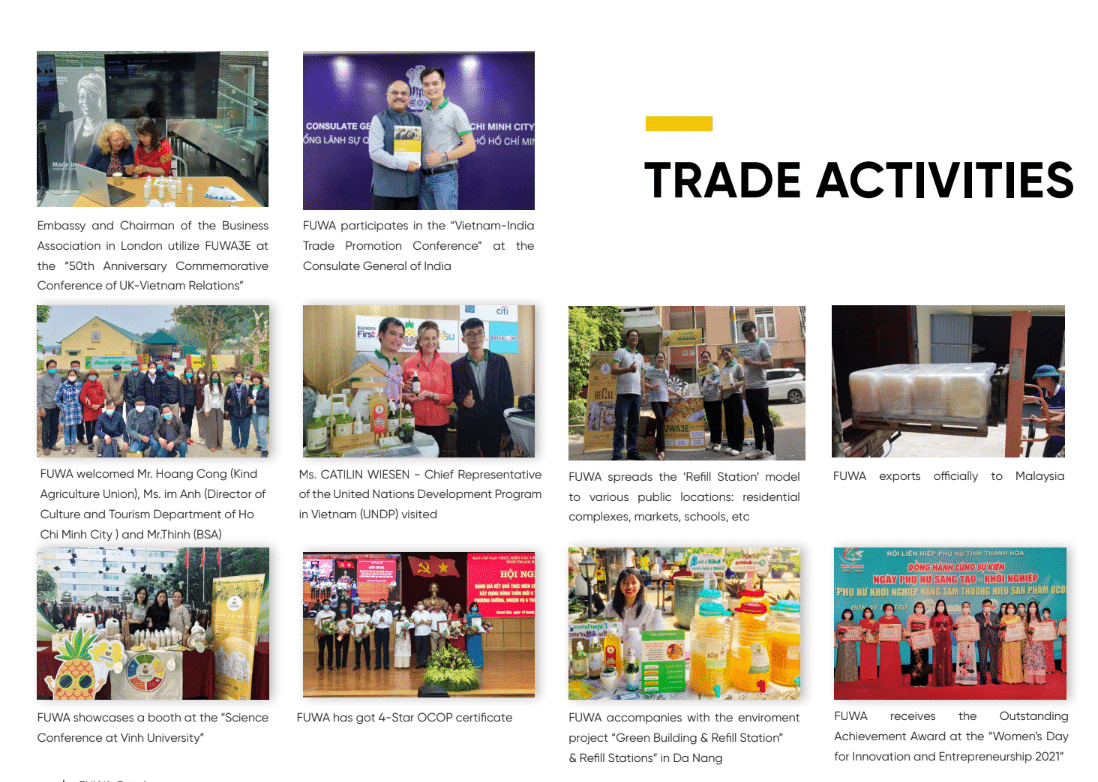
- Online distribution:
In the digital age, FUWA has taken advantage of e-commerce platforms and online trade channels including Amazon, Shopee, Lazada, TikTok Shop and Tiki to reach consumers nationwide. E-commerce trade activities enable FUWA to tap into the growing trend of online shopping and cater to environmentally-conscious consumers nationally.
- Offline distribution:
FUWA has distributed its eco enzyme-based natural wash products to 1000+ retailers, wholesalers, or directly to consumers through physical stores.
Network of over 1000 sales agents across Vietnam
- International Trade:
Expanding into the international market is a journey full of challenges but also immense potential. Starting from 2023, FUWA identified the need for a systematic strategy, high determination, and relentless effort. FUWA has been gradually approaching the Global market.
Up to date, Fuwa products have appeared in the following countries: Americas (USA, Canada), Europe (Germany, Italy), Asia (Singapore, China, India, Malaysia).
- Press and Media
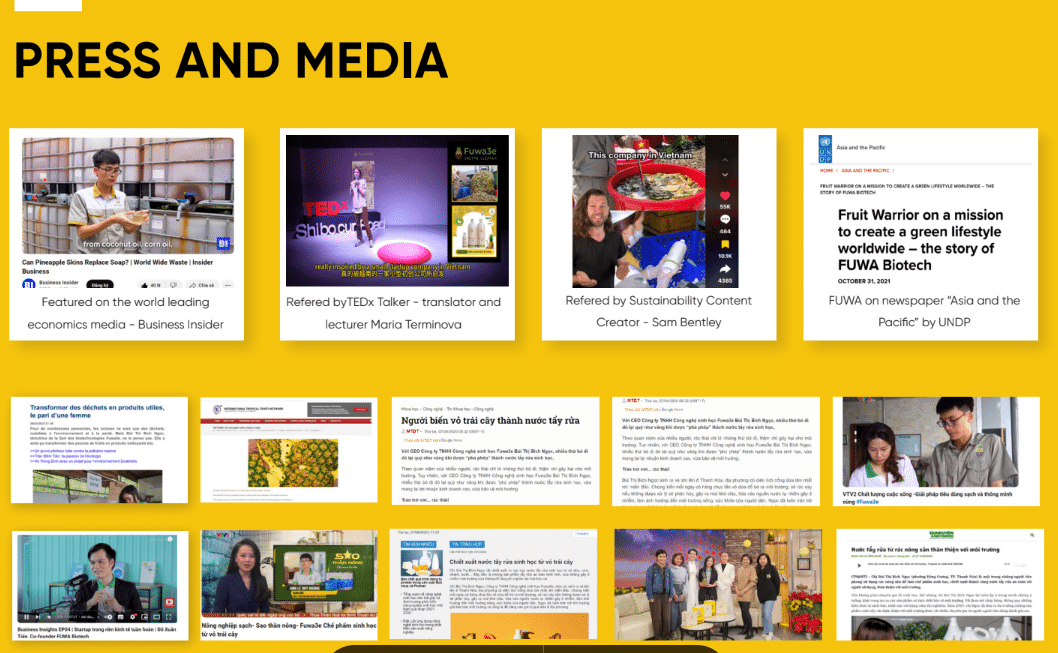
LEARNING CURVE
Key lessons:
– Unique Innovation: FUWA3E demonstrated the importance of innovation in sourcing raw materials by utilizing pineapple skins, an agricultural byproduct, to create bio-enzymatic cleaning products. This highlights the potential for businesses to find creative solutions by repurposing waste materials.
– Sustainable Practices: FUWA3E’s commitment to eco-enzyme technology not only produced effective cleaning products but also contributed to environmental protection and resource conservation.
– Market Expansion: Through its success in Vietnam, FUWA3E showed the potential for market expansion beyond national borders. FUWA3E has successfully exported its products to various markets, encompassing destinations such as the USA, Germany, Malaysia, and more.
– Brand Identity: The development of FUWA3E’s brand identity as a leader in organic cleaning products highlights the importance of aligning business values with consumer preferences. FUWA’s emphasis on health, sustainability, and environmental responsibility resonated with consumers, contributing to brand loyalty and market success.
Improvement strategy:
To enhance FUWA’s operations and reach our full potential, we have been developing a comprehensive strategy focusing on the followings:
– Expansion of Refill Stations: We plan to invest in building additional refill stations strategically located in high-traffic areas to increase accessibility and convenience for customers. This can be achieved through conducting market research to identify optimal locations based on demand, demographics, and competition.
– Brand Expansion: FUWA is considering partnerships or franchising opportunities to accelerate brand growth and penetration into different regions. Thus, we are investing in branding initiatives, including marketing campaigns and sponsorships to enhance brand visibility.
– Export Promotion: We have been participating in trade fairs, industry events, and business delegations to showcase FUWA products and establish partnerships with overseas distributors and retailers. Additionally, identifying more target export markets with high demand for eco-friendly products has been our top priority.
– Technology transfer and licensing: At FUWA, we firmly believe in the transformative potential of our eco-enzyme technology, since this innovative solution holds the key to addressing pressing environmental challenges. Through technology transfer initiatives, we aim to share our eco-enzyme technology with partners and stakeholders worldwide.
SLIDES
REFERENCES
- Temkin, A. M., Geller, S. L., Swanson, S. A., Leiba, N. S., Naidenko, O. V., & Andrews, D. Q. (2023). Volatile organic compounds emitted by conventional and “green” cleaning products in the US market. Chemosphere, 341, 139570.
- Sabharwal, Jyotie (2015). Health Issues and Environmental Impact of Cleaning Agents. International Journal of Novel Research in Life Sciences, 2, 31-32.
- Buchmüller, K., Bearth, A., & Siegrist, M. (2020). Consumers’ perceptions of chemical household products and the associated risks. Food and chemical toxicology, 143, 111511.
- Sithasa Kanchanavijaya (2021). Fruit Warrior on a mission to create a green lifestyle worldwide – the story of FUWA Biotech. UNDP. https://www.undp.org/asia-pacific/news/fruit-warrior-mission-create-green-lifestyle-worldwide-story-fuwa-biotech [Accessed on 08/05/2024].
- Van Hien (2015). Hiểm họa ô nhiễm từ chất tẩy rửa. VNBusiness. https://vnbusiness.vn/kinh-doanh-xanh/hiem-hoa-o-nhiem-tu-chat-tay-rua-1007565.html. [Accessed on 08/05/2024].


